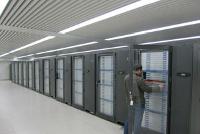China's Tianhe-2 named world's fastest supercomputer
03:41PM Mon 10 Jun, 2013

 NEW DELHI: China's Tianhe-2 supercomputer, aka Milkyway-2, recently measured at speeds of nearly 31 petaflops surpassing the current record holder by 74 per cent, Ars Technica, the technology magazine reported. And it was not even running at its full capacity!
The numbers were revealed by University of Tennessee professor Jack Dongarra, who introduced the computer speed measuring Linpack benchmarks, and who helps compile the biannual Top500 list of the world's most powerful supercomputers.
One petaflop is a thousand trillion or one followed by 15 zeroes number of operations per second.
According to Ars Technica, the fastest result was achieved using 90 per cent of the machine capacity. The stats come from a five-hour Linpack test using 14,336 nodes and 50 GB of memory of each node.
The test results place the Tianhe-2 ahead of the world's current title holder, which is the Cray XK7 system-based Titan at the Oak Ridge National Laboratory in the US.
Scheduled to be installed at the National Supercomputer Center in Guangzhou before the end of this year, Tianhe-2 is being assembled and tested at China's National University for Defense Technology (NUDT). Once operational, Tianhe-2 "will provide an open platform for research and education and provide high performance computing service for southern China," Dongarra wrote, according to Ars Technica.
Does that mean China will nudge Titan off the top of the Top500 list? Time will tell. Interested watchers await June 17, when the latest rankings will be issued as part of the twice-yearly Top500 list. As the official record, that list is updated twice a year with the next list due out on the 17th.
Tianhe-2 has a theoretical peak performance of 54.9 petaflops. Measurements for the Top 500 list always fall somewhat short of theoretical peaks, but Tianhe-2 could certainly improve on its score of 30.65 petaflops if it ran Linpack across the entire system.
Tianhe-2 is the follow-up to Tianhe-1, which was #1 in the world in November 2010 and ranked eighth in the most recent list, with a speed of 2.57 petaflops.
Source: TOI
NEW DELHI: China's Tianhe-2 supercomputer, aka Milkyway-2, recently measured at speeds of nearly 31 petaflops surpassing the current record holder by 74 per cent, Ars Technica, the technology magazine reported. And it was not even running at its full capacity!
The numbers were revealed by University of Tennessee professor Jack Dongarra, who introduced the computer speed measuring Linpack benchmarks, and who helps compile the biannual Top500 list of the world's most powerful supercomputers.
One petaflop is a thousand trillion or one followed by 15 zeroes number of operations per second.
According to Ars Technica, the fastest result was achieved using 90 per cent of the machine capacity. The stats come from a five-hour Linpack test using 14,336 nodes and 50 GB of memory of each node.
The test results place the Tianhe-2 ahead of the world's current title holder, which is the Cray XK7 system-based Titan at the Oak Ridge National Laboratory in the US.
Scheduled to be installed at the National Supercomputer Center in Guangzhou before the end of this year, Tianhe-2 is being assembled and tested at China's National University for Defense Technology (NUDT). Once operational, Tianhe-2 "will provide an open platform for research and education and provide high performance computing service for southern China," Dongarra wrote, according to Ars Technica.
Does that mean China will nudge Titan off the top of the Top500 list? Time will tell. Interested watchers await June 17, when the latest rankings will be issued as part of the twice-yearly Top500 list. As the official record, that list is updated twice a year with the next list due out on the 17th.
Tianhe-2 has a theoretical peak performance of 54.9 petaflops. Measurements for the Top 500 list always fall somewhat short of theoretical peaks, but Tianhe-2 could certainly improve on its score of 30.65 petaflops if it ran Linpack across the entire system.
Tianhe-2 is the follow-up to Tianhe-1, which was #1 in the world in November 2010 and ranked eighth in the most recent list, with a speed of 2.57 petaflops.
Source: TOI











